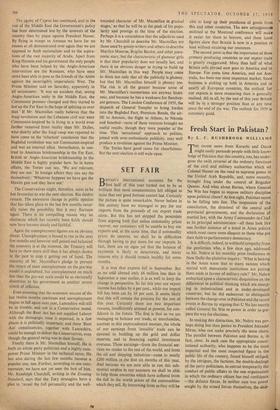SET FAIR
BRITAIN's international accounts for the .)first half of this year turned out to be so brilliant that most commentators felt obliged to insist that our good fortune cannot last. Certainly the picture is quite remarkable. Never before in this century have we managed to pay for our imports from the proceeds of our export trade alone. But this has not stopped the pessimists from arguing both that unless commodity prices recover, our customers will be unable to buy our exports' and, at the same time, that if commodity prices do recover, we shall be in difficulties through having to pay more for our imports. In fact, there are no signs yet that the balance of payments is likely to deteriorate, and many reasons why it should remain healthy for some months.
It is true that exports fell in September. But as we sold abroad only £6 million less than in September a year earlier, it is as well to keep the change in perspective. So far this year our export income has fallen by 4 per cent., while our import bill has been cut by 10 per cent. It seems likely that this will remain the position for the rest of this year. Certainly there are two important reasons, insufficiently stressed at present, for con- fidence in the future. The first is that as we are managing to balance our trade, or merchandise, account in this unprecedented manner, the whole of our earnings from 'invisible' trade can be devoted to building up the gold and dollar reserves, and to financing capital investment overseas. These earnings—from the financial ser- vices we render to the rest of the world, and from the oil and shipping industries—came to nearly £200 million in the first six months of this year. And because we are now able to run this sub- stantial surplus in our accounts we shall be able to help those countries which have suffered from the fall in the world prices of the commodities which they sell. By borrowing from us they will be able to keep up their purchases of goods from this and other countries. The new arrangements outlined at the Montreal conference will make it easier for them to borrow, and these latest figures show that Britain is now in a position to lend without straining our resources.
The second point is that the importance of these primary producing countries to our export trade is greatly exaggerated. More than half of what Britain sells abroad now goes to America and to Europe. For some time America, and not Aus- tralia, has been our most important market. Since business is picking up both in America and in nearly all European countries, the outlook for our exports is more reassuring than is generally realised. All in all, by the end of this year Britain will be in a stronger position than at any time since the end of the war. The outlook for 1959 is extremely good.


































 Previous page
Previous page